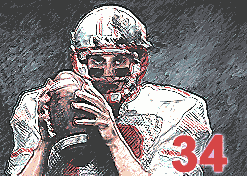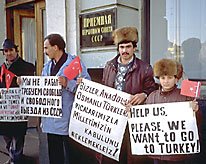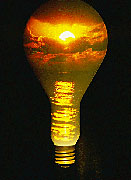Film, Radio and TV - 34 |

The Social Impact Part V
In this final module on the Social Impact of Television we'll look at some of the positive aspects of the medium. The points will be briefly summarized in three major categories. |
Newspapers and the print media provide a degree of separation from reality, but TV graphically brings happenings right into living rooms, complete with color, sound, time sequences, and even to some degree, the associated "feelings." Reading about thousands of children starving in Africa or some other country is one thing; actually seeing the misery is quite another. Reading about people being tortured because of their political beliefs is one thing; hearing the people involved talk about what happened to them, and seeing their scars (and maybe even their tears) is quite another. Compared to newspapers, television may be superficial when it comes to reporting facts. However, good pictures can still be worth 1,000 words. Pictures can convey many things beyond facts and statistics. In democracies, television can be used to inform the electorate about things they need to know to make informed choices at the ballot box. When TV is responsibly programmed and viewed with a critical, educated eye, it's capable of looking through the gloss and façades of people and events, giving us glimpses of the reality lying beneath. Television is capable of making us an "eyewitness" to events as they happen. These events can range from the hostile invasion of a country to "Monday Night Football." In this regard, TV breaks down the barriers of distance and becomes an extension of our senses. 2. Television
provides needed escape and relaxation. To a great extent we've already discussed this in Suffice it to say, television allows us to momentarily escape our problems and experience the experiences of other people. We can become awestruck with the beauty of and grace of the arts, or caught up in the frenzy and excitement of an athletic event. We can even allow ourselves to be momentarily lost in a beautiful fantasy world. Thus, our spirits can be lifted; and sometimes even hope and faith restored.
Today, that time is typically cut down to a day--or even a few hours. Included in this category are new products and services that will make our life easier or safer, new recipes, important safety procedures, and even instructions on home improvement and repair. With television we are put in the center of the marketplace of ideas. We can compare these ideas, evaluate them, and then decide for ourselves whether to accept or reject them. These new ideas can also threaten traditional beliefs and the established order of doing things. But, we must keep in mind that a society that does not allow itself to change and adjust to the times may find that internal pressures mount to a point of an explosion in the form of political revolution or widespread internal violence. This has happened in many countries throughout history. In the minds of some analysts the reluctance to make needed changes was what brought on the recent disintegration of Soviet Russia (the USSR), one of the largest and most powerful nations in the world. Even on a personal level, not to change can mean that we get left behind professionally, and replaced by people with newer ideas-- or even be replaced by a machine. In today's competitive, information-centered world, to stand still is to fall behind. In the next module we'll look at broadcast news. |
To next module
To index © 1996 - 2005, All Rights Reserved.
|

 previous modules.
previous modules. mass media, an important threat to health, a new medicine, or improved ways of doing things could take months or even years to become commonly known.
mass media, an important threat to health, a new medicine, or improved ways of doing things could take months or even years to become commonly known.